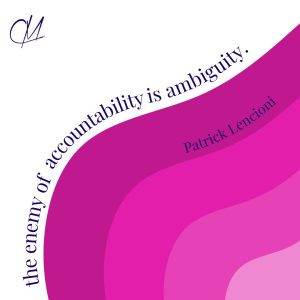 If the enemy of accountability is ambiguity, as Patrick Lencioni is quoted as having said, then surely ambiguity is solved with clearly communicated, concisely written, and consistently followed processes and procedures. Is it not?
If the enemy of accountability is ambiguity, as Patrick Lencioni is quoted as having said, then surely ambiguity is solved with clearly communicated, concisely written, and consistently followed processes and procedures. Is it not?
I learned today that if I’m not in a position to make things clear, concise, and consistent, then I’m not a fan of ambiguity.
In fact, it downright pisses me off.
My kid’s school is continuously ambiguous when they run events. It’s evident by how poorly they organise them that they don’t have a workflow map that outlines the way events need to be managed.
A start-up company gave me a piece of work with no outline of precisely what they required or by when, leaving it up to me to figure it out. They gave the reason that they’re a start-up and don’t have time to think of things like that.
Bullshit. You will ALWAYS waste more time when you’re ambiguous.
And, to Patrick’s point, which I hope I’m not taking out of context or bastardising, when you’re ambiguous, you cannot be held accountable for what you’ve said or instructed. You’ll always have the excuse that it wasn’t your responsibility.
I like the acronym of the 6Ps: Precise Prior Preparation Prevents Pisspoor Performance.
When you’re asked questions that call for you to be held accountable to your information or instructions, it feels uncomfortable because it is evident that you haven’t done the 6Ps; however, the best way to fix it isn’t to shy away, deflect, or avoid; it’s to answer the questions honestly and then move on.
What makes me angry about people who are ambiguous isn’t the ambiguity, because it’s evident (and forgivable) that these people lack communication skills. No, it is the lack of taking responsibility for it when asked for clarification.
Being honest isn’t hard; no one expects you to know everything.


